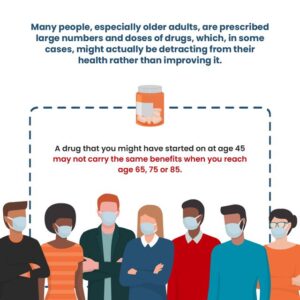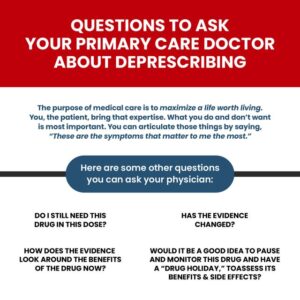Thanks to shifting disease patterns and advances in medical care, life expectancy has been steadily rising in the United States over the past century, with more people living into very old age than ever before. Everyone’s goal is to enjoy good health and independence well into one’s golden years. However, certain factors can worsen our quality of life as we age, including a range of illnesses and the side effects of medications used to treat them. Why we should fight polypharmacy?
Risks Include Falls from Dizziness or Drowsiness

This risk is even higher in cases of “polypharmacy” — that’s the term doctors use to describe the use of multiple medications by one person. “There are innumerable adverse effects of polypharmacy — almost anything one can imagine,” says Robert A. Murden, MD, an internal and geriatric medicine physician at the Ohio State University (OSU) Wexner Medical Center. “Some of the most common and serious, however, are sleepiness or dizziness, which can result in falls and fractures, and interactions between two or more medicines.”
Interactions between a medicine and a medical condition can also occur — for example, when a medicine for arthritis makes a kidney problem worse, or a medicine for urinary incontinence makes a memory problem worse.
The side effects of any individual medicine can increase the patient’s risk of being hospitalized or placed in a nursing home. Taking many medications can make it difficult to keep track of all of them, according to Guibin Li, MD, PhD, an associate clinical professor in the division of internal and geriatric medicine at the OSU Wexner Medical Center. And the cost of medicines are often mentioned as a problem for seniors, so taking more meds than are needed is financially painful.
Almost Half of Older Adults Take Unnecessary Meds

Research shows that almost half of older adults are taking at least one medication that isn’t necessary for their condition, and this can lead to negative consequences — particularly in this age group. These individuals are more vulnerable to the effects of polypharmacy for several reasons. For one, they receive more medications for diseases that commonly affect people as they age, including cardiovascular disease, Alzheimer’s disease, diabetes and cancer.
“The more medications you take, the greater the risk of a significant drug interaction that could cause harm to the patient,” explains Christopher M. Bland, PharmD, FCCP, FIDSA, BCPS, a clinical associate professor at the University of Georgia College of Pharmacy. Another issue is that elderly patients often have reduced liver and kidney function compared to younger, healthier patients. “Therefore a ‘normal’ dosage of a medication for a younger patient may be too high for an elderly patient, resulting in an adverse effect.”
Dr. Murden adds that older folks are “more likely to suffer the consequences of polypharmacy — for example, a fall is more likely to cause a fracture in an 85-year-old versus a 45-year-old — and they are more likely to have the medical conditions, such as arthritis or memory problems in the example above, that medication side effects can worsen.”
Firsthand Experience of Polypharmacy
I got a clear glimpse into these issues when my 77-year-old father received an ever-increasing number of prescriptions during a temporary health crisis due to a heart rhythm problem. In one instance, soon after his doctor prescribed a new medication (verapamil), he began experiencing serious side effects, including extreme dizziness and fatigue.
A quick web search informed me that the drug shouldn’t be taken by people with a low ejection fraction — the term for the heart’s blood-pumping capacity, which my dad had at the time. When I learned about this, I urged him to call his pharmacist, who indeed expressed concern about the prescription and advised him to call his provider ASAP. He did, and the doc told him to discontinue the medication immediately.
Thankfully, my father is back in good health now, but that experience alerted me to how easily these dangerous situations can get lost in the shuffle (and what important allies pharmacists can be!), and how important it is to stay involved and informed about the medical care and prescriptions that our older relatives are receiving. Offer to go with them to doctors’ appointments, and if you do, mention to the provider any troubling symptoms or changes you’ve noticed.
Expert Safety Tips to reduce Polypharmacy

The experts offered the following tips on other ways we can help to keep our aging loved ones safe.
- Consult with a clinical pharmacist or geriatrics specialist for a review of all medications your relative is taking, the reason they are taking each one, and their potential side effects.
- When possible, patients should avoid going to too many doctors, says Dr. Murden. “Having multiple doctors often leads to polypharmacy, as each one may prescribe only for the condition they are treating and not even consider other conditions or other medicines that are taken, so minimizing the number of doctors is beneficial.”
- If possible, avoid taking a medicine to counteract the side effect of another medicine — for example, taking a sleeping pill to deal with insomnia from another drug. “The answer in this case is to stop the original offending medicine,” Dr. Murden notes, so be sure to address this type of situation with your loved one’s physician if it arises. “Some patients are also very interested in getting a new medicine every time there is a new problem, so advising elderly relatives that they should try to avoid getting medicines unless necessary can cut down on this problem.”
- Dr. Bland encourages elderly patients and their caregivers to ask lots of questions to clarify any medication issues: “In my experience, patients or family members sometimes don’t want to ‘bother’ healthcare providers, but that should never keep someone from asking questions when clarification is needed.”
- Try to develop a relationship with a single pharmacy, and specifically a pharmacist within that pharmacy. “Pharmacists are extremely well trained in these areas and can help patients better understand their medications and contact providers if needed,” says Dr. Bland. It is also best to have all prescriptions filled in one location, because “if you use multiple pharmacies, there is an increased risk of drug interactions not being caught, as not all medications taken by the patient will be known at each pharmacy to allow for comprehensive drug-interaction screening.”
- Herbal medications and vitamins should be considered drugs. “There is often an incorrect belief that herbals are safe because they are natural — that can be the furthest from the truth, especially when given with prescription medications,” Dr. Bland cautions. “Drug interactions between herbals and over-the-counter or prescription medications can be significant and harmful, and should be discussed with a healthcare provider before these are taken together.”
- Additionally, Dr. Li advises patients to keep an organized, updated medication list that they can take to every doctor’s appointment, and to use a pill box to keep track of medications taken. Encourage your older relatives to do so, and help them with these tasks if needed. The side effects of any medication should be promptly reported to the patient’s doctor.
Many medicines are available to slow or improve the inevitable symptoms of aging. Many chronic conditions and diseases become more common as we age. Determining which medicines are important for health and quality of life and safely cutting out the rest is an important part of the healthy and happy old age that we all seek for ourselves and loved ones.






